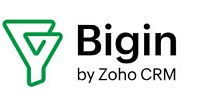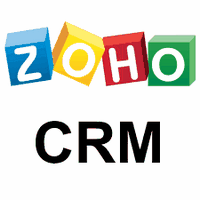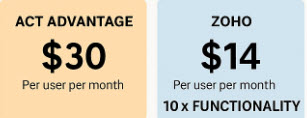 Back in 2017 I had to make a difficult decision. After many, many years invested in Act!, it was finally time to move on. A decision I didn’t take lightly!
Back in 2017 I had to make a difficult decision. After many, many years invested in Act!, it was finally time to move on. A decision I didn’t take lightly!
My relationship with Act! had been a long one. I’d written 7 books on Act! as well as created a set of learning videos for LinkedIn Learning. I’d built up deep knowledge of its database, not only in how tables are related but also the quirky way that Act! stores data.
I was a bit of an Act! geek, relishing the opportunity to answer questions on internet forums and of course for my customers. How could I simply leave all that experience behind and jump ship – to migrate from Act! CRM? In many ways it was simple.
If I didn’t move on, the value of my expertise would wither on the vine.
Having been involved with Act! since 1995, I feared I’d need counselling to get over the loss! But, perhaps not so surprisingly, moving to Zoho was a breath of fresh air. I can honestly say that I’ve never looked back.
What’s so bad about Act! CRM?
It’s not that there’s one big, glaring fault. It’s a multitude of things where Act! has just not kept up. Let me give you an example.
I wrote the last of my Act! books, Act! by Sage for Dummies, in 2008. Imagine my surprise when I discovered that the only real thing that had changed in 16 years was the addition of Act! Marketing Automation and Tables, both of which carried an additional cost above and beyond the price of the Act! software. This pattern of not updating the software was the factor that pushed me over the edge eventually.
In fact, in doing my research for this article, I watched an Act! product video from 2024. The Act! product looks exactly the same as it did in 2008!
A modern CRM system should be frequently updated to take advantage of the latest technologies, integrations, user interface improvements, and feature development in response to user demands. All concerns that Act! seems well, unconcerned with!
Here are a few examples of where Act! is falling behind, and why you should consider migrating from Act!:
Act! is a Contact Centric Database
Act! is contact-centric; to the average Act! user the way the product functions might seem convenient as you can simply leave the company field blank if you don’t know it.
However, the problem comes when you’ve got multiple contacts, say 200, in one company. It means that when you look for the chronology of interactions (phone calls, emails, etc.) at the Company level, you’d end up having to scroll through all 200 records! These contacts will be difficult to combine into a single company. Although Act! added Company functionality approximately 20 years after its inception, many of your contacts might have differing address information and even different spelling variations of the Company name which makes compiling multiple contacts into a single Company record extremely challenging.
Zoho has a record for both the Account and associated Contacts. People who work at the same organization are stored in a tab of related data. Interactions with individuals are stored against the contact record, and are also summarized at the organization level. This creates a global view of how you interact with that organization.
Email addresses and mobile phone numbers are stored on the person’s contact record, and information about the organization like turnover, number of employees, etc. are stored on the organization record. This makes for much better modelling and a more intuitive system. It also makes reporting, metrics and dashboards a lot more powerful.
The Act! Attachment Design is Flawed
The Act! Details page can store additional documents related to a contact. This functionality has undergone multiple changes over the years. The last iteration allowed you to literally duplicate an existing document into the Act! Attachments folder. This created two major problems: one, you now had two separate copies of a single document located in two different locations, and two, you might end up with a very large set of files in a single folder as the Attachments folder lacks the ability to create sub-folders. And, in addition to documents, this Attachments folder also stores email attachments.
Zoho has a Work Drive, an online file management system, allowing not only folder creation but direct links to contact records. The bottom line is that your documents will be stored in a well-organized, safe environment.
Act! has Poor Email Integration with Outlook
Outlook integration is an option, but it’s buggy and it rarely works properly. It is also dependent on both the version of Act! and the version of Outlook you are using; not all versions of Act! support all versions of Outlook. Upgrade Outlook and you’ll have to reinstall and possibly upgrade your version of Act!.
Zoho has great Outlook integration, and tend to work with all Outlook versions. Modern CRM systems like Zoho CRM even use AI to gage the mood of an email message and to create contact summaries.
The Act! Database Engine is limited
Act! uses SQL Express as its database engine. This causes a number of issues including the fact that the size of an Act! database is limited to 10 Gigs and is not accessible to Mac users. When the Act! for Web product was developed many of the desktop features were eliminated. Desktop users also have to deal with the issues of backups, upgrades and data security.
Act! Lacks Scalability
Act! has a number of glaring omissions: for example, there is only one Contact type and it lacks the ability to include transactional data including products, quotes, orders and invoices. There’s no ability to create new record types without purchasing an addon product. There is no integration to other software or VoIP phone systems without purchasing a third party addon which drives the price of Act! even higher. Act!’s .api is buggy and there are limited integrations.
Zoho includes the ability to store your product catalog, create quotes, and produce invoices. Zoho integrates to over 400 VoIP phone systems and has a strong .api backend that allows for easy integration to other back office software. Because Zoho is a major player in the CRM arena integrations (most of them free) exist to thousands of applications.
Act!’s Prices Keeps Increasing & Is Buggy
Act!’s pricing has steadily increase over the years leaving many Act! users in sticker shock. The price increases might be justified if new features had been added but they haven’t. Their current price for the outdated desktop product is $468/year; the cloud version is $360/year. In addition, there are dozens of unresolved “bugs” that continue to plague users year after year.
Zoho One, the flagship product, is only $444/year and includes over 40 additional apps; Zoho Standard, which has more functionality than Act! Cloud, is only $168/year. They have had few price increases over the years and the ones they’ve had have been extremely small.
Act! Premium for Web has many limitations
The Act! Premium for Web product is missing over 20 core features found in the desktop product. Act! for Web doesn’t always play nice with various browsers; for example you might run into issues if you are using an older version of Chrome, Safari or Edge. Many users have issues trying to log into the Act! Mobile app making access to their Act! data while working from a smart phone or tablet a challenge.
Zoho is 100% web-based. All versions of Zoho CRM – from the Freemium product to the top of the line Zoho CRM Enterprise edition – include more features and functionality than Act! Premium for Web. Zoho data is fully backed up in secured data centers, generally with a 99.99% uptime.
Should you migrate from Act! CRM?
As you can see, there are a number of reasons why Act! just hasn’t kept pace with other CRM products such as Zoho. What’s your biggest frustration with Act!? Is it time that you considered moving on too?
We’ve helped over 300 clients migrate from Act! CRM. Contact us if you’d like to learn more.



